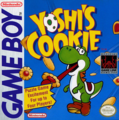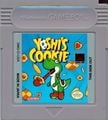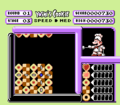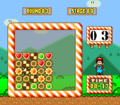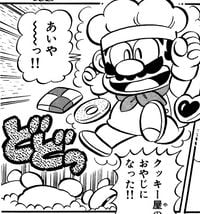Yoshi's Cookie
- This article is about the game. For the item of a similar name, see Yoshi Cookie.
- Not to be confused with Yoshi and Cookies.
| Yoshi's Cookie | |
|---|---|
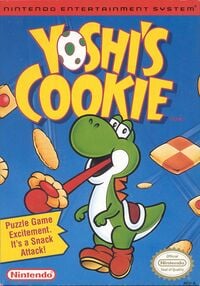 NES box art For alternate box art, see the game's gallery. | |
| Developer | Nintendo R&D 1 (NES and Game Boy) Bullet-Proof Software (SNES) |
| Publisher | Nintendo (NES and Game Boy) Bullet-Proof Software (SNES) |
| Platform(s) | Famicom/NES, Game Boy, SNES, Virtual Console (Wii) |
| Release date | Famicom/NES: Template:Release Game Boy: Template:ReleaseSNES: Template:ReleaseVirtual Console (Wii): Template:Release[?] |
| Genre | Puzzle |
| Mode(s) | Single-player, multiplayer |
| Input | NES:
Super NES: Wii: Game Boy:
|
Yoshi's Cookie is a puzzle game, similar to Tetris, developed by Nintendo R&D 1 and published by Nintendo for the NES and Game Boy in 1992, and developed and published by Bullet-Proof Software for the SNES in 1993. Upon its release, Yoshi's Cookie received mixed to positive reviews.
The SNES version received a Japan-only Super Famicom re-release, titled Yoshi no Cookie: Kuruppon Oven de Cookie with an added mode. Additionally, a Japan-only remake for the Nintendo GameCube was included in Nintendo Puzzle Collection, where it was bundled alongside Dr. Mario 64 and Panel de Pon. The remake added a story mode the previous three versions lacked. Yoshi's Cookie was later ported to the Wii's Virtual Console in 2008, but it was delisted from the service on October 2013 in all regions except South Korea. Eventually, the game was later delisted from South Korea in 2019 due to the closure of the Wii Shop Channel. Yoshi's Cookie was also originally planned to be on the Wii U's Virtual Console, but with the Wii U Nintendo eShop discontinued, it was ultimately never released.[1]
Gameplay
The objective of the game is to clear the stage of cookies, which appear from the top and the right of the screen. To clear cookies, the player needs an entire row of the same cookies either horizontally or vertically. To move the cookies, the player has to press /
/
on a cookie and press a direction on the directional pad. Depending on the direction the player presses, the row the cookie is on is then moved either vertically or horizontally. There are six types of cookies: heart cookies, sunflower cookies, green cookies, checkered cookies, ring shaped cookies, and Yoshi Cookies (shaped like Yoshi's head). The Yoshi Cookie can be used as a substitute for other cookies, allowing the player to eliminate rows of cookies without the proper piece(s). The game consists of two modes: Action and VS. The third mode, Puzzle, is exclusive to the SNES version.
Action Mode
Action Mode is a game consisting of 10 rounds, with each round containing 10 stages. Before the game starts, the player can set the round which who wants to play in, the falling speed of the blocks and the music. After the player beats a certain stage, who can view a short, humorous cutscene with Mario.
Rounds 11-99 are also unlockable; within these rounds, the cookies are replaced by Mario enemies (except for the Yoshi Cookie), resembling the graphics from the original Yoshi game. These rounds also add Koopa Troopa shells; the Koopa tiles do not materialize from the corners of the screen, and as such, can only be eliminated via the Yoshi-shaped cookies. To access the later rounds in the NES and Game Boy versions (as revealed in the game's ending), the player must do the following:
- Set the music type to "Off".
- Set the speed to "Hi".
- Set the round to "10"; then hold Up + Select to advance to round 11.
VS Mode
VS Mode is a simple 2 player game, with the player also able to challenge the computer in the SNES and Game Boy versions. The player starts off by picking one of four characters (except in the NES version): Mario, Peach, Yoshi, or Bowser.
The goal of the game is to accumulate 25 points (with each match worth one point) before the opponent to win. The player must make a match within the time limit, as allowing the time bar to fill up (or the fuse to run out) will result in a loss for the player.
The first player to win three rounds takes the match.
Aligning Yoshi Cookies will either benefit or harm the player. Depending on the special shown, the player should be careful not to penalize themselves.
- List of Yoshi Cookie effects
- Blind: The player is temporarily unable to see the middle nine tiles of their board.
- Panic: The player's board is randomized and cannot take action while the board is being randomized.
- Slave: The player temporarily loses control of their board as it is being controlled by the player who triggered it. Nothing happens if Slave targets themselves.
- −3: The player loses three points.
- +3: The player gains three points.
- −7: The player loses seven points.
Puzzle
This mode appears only in the SNES version of the game. The objective of Puzzle Mode is to clear the field with a limited number of moves. The puzzles range from simple to complex. There are a total of 100 puzzles, with ten rounds of ten puzzles each.
Staff
- Main article: List of Yoshi's Cookie staff
The Game Boy and NES versions were developed by Nintendo R&D 1 and published by Nintendo, with Gunpei Yokoi acting as the producer.
The SNES version was developed and published by Bullet-Proof Software as they retained the rights for the SNES version and Nintendo licensed the characters and allowed them to use the "Yoshi's Cookie" Branding. Alexey Pajitnov, creator of Tetris, designed the puzzles.
Cutscenes
The round completion cutscenes for Action Mode are as follows:
- Round 1: Mario chases after a rolling ball (presumably cookie dough) and catches it, striking a pose.
- Round 2: Mario chases after the rolling ball, only ends up rolling with the ball when grabbing on.
- Round 3: Mario chases after the rolling ball, only to be humorously chased away by a larger bouncing ball (implied to be its parent)
- Round 4: The ball bounces before hitting a wall, which then causes it to roll backwards into Mario (who was right behind it), knocking him over while the ball spins erratically.
- Round 5: The ball spins erratically as Mario chases after it, only to end up eaten by Yoshi, to Mario's shock and Yoshi's amusement.
- Round 6: Mario chases the ball down a slope, only to end up overtaking it in speed.
- Round 7: The ball rolls then hits a wall and rolls back, with Mario proceeding to jump, only to end up squishing the ball.
- Round 8: The ball falls down a ledge after rolling. Mario chases after it, only to find himself tripping due to unknowingly being on the ball, and the ball rolling away as Mario falls onto his back.
- Round 9: The ball rolls to a cliffside as Mario chases after it, only for the ball to fall off the cliff, and ascend as an angel, with Mario looking sheepishly at the player.
- Round 10: The ball is rolling and Mario and Yoshi, from opposite sides of the screen, proceed to grab it and then strike poses alongside the ball.
In the SNES version, the ball was revealed to be part of the Yoshi Cookie sign that fell off, and also has a slight animation of what occurs, and in the final one has Peach and Bowser joining the celebration during the credits.
Development
Yoshi's Cookie started as an arcade game named Hermetica (later renamed Archimedes)[2] developed by the company Home Data. This incarnation of the game featured alchemy-themed graphics.[2] The game received a very poor reception when it was location-tested at arcades in Kansai and Tarumi, causing Home Data to abandon further development and sell the rights to the game to Bullet-Proof Software.[2] Outside of answering design questions from designer Alexey Pajitnov, the creator of Hermetica had no involvement in the game's reworking as Yoshi's Cookie.[2]
It appears that, before Yoshi's Cookie's production, B.P.S. developed a generic version of "Hermetica" known as Inaro in 1991; a sample of this game was on the Blue Planet Software website in the 2000s.[3] Several home ports of Yoshi's Cookie feature copyright information referring to Inaro, namely the Wii Virtual Console version.[4]
Critical reception
| Reviews | |||
|---|---|---|---|
| Release | Reviewer, Publication | Score | Comment |
| Wii | Marcel van Duyn, Nintendo Life | 6/10 | "Yoshi's Cookie is a decent puzzler that's a tad more original than puzzlers of a falling block nature, but we would suggest waiting for the SNES version to show up instead which, aside from improved audio and visuals that use sprites from Super Mario World, features more content via an added puzzle mode and amusing cutscenes." |
| Wii | Lucas M.Thomas, IGN | 6/10 | "Overall, Yoshi's Cookie is a fair and favorable puzzler that – while not a candidate for immediate recommendation – wouldn't be a waste of your Wii Points should you decide to spend 500 of them on it. It's one of Nintendo's more obscure puzzle designs, and it sets itself apart in that it's not a clone of the "falling block" style of Tetris like so many other puzzlers are. Give it a look if you're a fan of the genre looking for something that's just a bit different." |
Gallery
- For this subject's image gallery, see Gallery:Yoshi's Cookie.
The Game Boy cartridge for Yoshi's Cookie
Media
- For a complete list of media for this subject, see List of Yoshi's Cookie media.
| File info |
| File info |
| File info |
References in later games
- Game & Watch Gallery 3: The Modern version of Egg has a Yoshi consuming various cookies, their designs coming straight from Yoshi's Cookie.
- Game & Watch Gallery 4: Due to the Modern version of Mario's Cement Factory replacing cement creation with cookie baking, Mario is creating Yoshi Cookies as a result.
- Tetris DS: A stage from this game makes an appearance.
- Paper Mario: The Thousand-Year Door and Super Paper Mario: One of the cookies in the Zess Cookie and Sweet Cookie Snack icon resembles the checkerboard cookie from Yoshi's Cookie.
- Yoshi's Woolly World: The Yoshi and Cookies stage is a reference to the game, and Yoshi Cookies appear as elements in the level.
- Super Mario Odyssey: In this title, Mario can wear a chef outfit that is identical to the one depicted in the NES version of Yoshi's Cookie.
- Mario Kart Tour: The chef outfit from Super Mario Odyssey reappears in this game as the outfit for Mario (Chef). A glider named Yoshi's Cookies, based off of the cookies in the game, is also featured.
Names in other languages
| Language | Name | Meaning | Notes |
|---|---|---|---|
| Japanese | ヨッシーのクッキー[?] Yosshī no Kukkī |
Yoshi's Cookie |
Trivia
- In the NES and Game Boy versions, there was a cutscene at the title screen where Mario would walk onto a screen with a jar of cookies. He would then try to open it, to no avail. He then gets an idea and walks off the screen. Yoshi comes up soon after and eats the jar whole. Mario then reappears with a hammer and begins chasing Yoshi off the screen. Later, he returns back on screen holding the cookie jar, which was empty to begin with. This, however, bears no influence on the game itself. This intro (slightly expanded to show Yoshi and Mario re-congregating and then striking a pose before walking off) was made for the SNES prototype of the game, but was taken out for the final release.
- The backgrounds used in the SNES version resemble those from Super Mario World.
- The SNES version of Yoshi's Cookie featured a slightly-updated version of Yoshi's appearance, in which he has a bigger head, longer and more human-like arms and shorter neck. This appearance would be later used in Super Mario World 2: Yoshi's Island and later games. This game also marks the first time in-game that Yoshi's speech comprises of his name, a trait later used in Yoshi's Story and popularized by Super Smash Bros.
- The title screen in the SNES version is a parody of the Metro-Goldwyn-Mayer logo.
- Hello Kitty no Beads Kōbō (ハローキティのビーズ工房), a Japan-exclusive Game Boy Color game, is effectively a sequel to Yoshi's Cookie; however, it lacks any Mario elements. Its gameplay is derivative of the original game; the player must create lines of one specific type of tile, rather than clearing out all of the pieces. The copyright screen of the game states "©1992 Nintendo", referring to Yoshi no Cookie's release date.[5]
References
- ^ Nintendo (April 17, 2013). Nintendo eShop - Wii U Virtual Console Sizzle Reel. YouTube. Retrieved August 7, 2019.
- ^ a b c d Twitter thread (April 20, 2015), English translation posted here. Retrieved September 7, 2017
- ^ "Inaro" page on Blue Planet Software website (Mirror of video)
- ^ "INARO™ Game concept ©1991-2008 Intellectual Property Consultants, Inc., used, under license, by Nintendo." - Yoshi's Cookie, Virtual Console (digital manual)
- ^ "Puzzle Collection: Hello Kitty no Beads Koubou" on the Sanrio Wiki
External links
- Japanese website (Game Boy)
- Japanese website (Wii Virtual Console)
- North American website
- European website
| Game Boy games | |
|---|---|
| Super Mario franchise | Alleyway (1989) • Baseball (1989) • Super Mario Land (1989) • Golf (1989) • Dr. Mario (1990) • Super Mario Land 2: 6 Golden Coins (1992) • Donkey Kong (1994) • Mario's Picross (1995) • Picross 2 (1996) |
| Donkey Kong franchise | Donkey Kong (1994) • Donkey Kong Land (1995) • Donkey Kong Land 2 (1996) • Donkey Kong Land III (1997) |
| Yoshi franchise | Yoshi (1991) • Yoshi's Cookie (1992) • Tetris Attack (1996) |
| Wario franchise | Wario Land: Super Mario Land 3 (1994) • Wario Blast: Featuring Bomberman! (1994) • Wario Land II (1998) |
| Miscellaneous | Tetris (1989) • The Legend of Zelda: Link's Awakening (1993) • Game & Watch Gallery (1997) • Game & Watch Gallery 2 (1997) |

